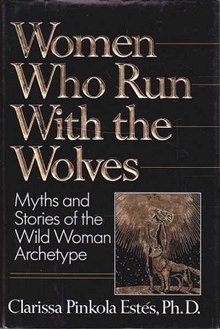Women Who Run with the Wolves
Women Who Run with the Wolves: Myths and Stories of the Wild Woman Archetype is a book by Jungian analyst, author and poet Clarissa Pinkola Estés, Ph.D, published in 1992 by Ballantine Books. It spent 145 weeks on The New York Times Best Seller list over a three-year span, a record at the time.[1]. Estés won a Las Primeras Award from the Mexican American Women's Foundation for being the First Latina on the New York Times Best Seller list.[2] The book also appeared on other best seller lists, including USA Today, Publishers Weekly, and Library Journal.[3]
 first edition | |
| Author | Clarissa Pinkola Estés |
|---|---|
| Country | United States |
| Language | English |
| Publisher | Ballantine Books |
Publication date | 1992 |
| Media type | |
| Pages | 520 |
| ISBN | 0-345-37744-3 |
Estés had been producing popular audiotapes of her stories and research and was approached by publishers to turn them into a book.[1]
In Women Who Run with the Wolves, Estés analyses myths, fairy tales, folk tales and stories from different cultures to uncover the Wild Woman archetype of the feminine psyche. The book stems from these interpretations of old tales and creates this wolf-woman parallel, by incorporating her own previous studies that suggest "wolves and women are relational by nature."[4] The notion of the archetype is associated with the work of Carl Jung. Estés produces this new collection of words to describe the female psyche in Women who Run with the Wolves as it is a psychology of women in the truest sense, a knowing of the soul.[5][6][7][8]
American folklorist Barre Toelken criticized Estés' analysis of the Bluebeard tale as conflating versions from separate cultures. Toelken held this as an example of a tendency of Jung-influenced psychologists, who may overlook the complexities of folklore studies, to build complex theories around a single version of a tale that supports a theory or a proposal.[9]
See also
References
- Sylvia Mendoza, The Book of Latina Women: 150 Vidas of Passion, Strength, and Success, Adams Media, 2004, p. 221.
- "A Legacy of Latina Leadership: Las Primeras Awardees, 1990-2014" (PDF). MANA, A National Latina Organization.
- "Nonfiction Book Review: Women Who Run with the Wolves: Myths and Stories of the Wild Woman Archetype by Clarissa Pinkola Estes, Author Ballantine $27.95 (560p) ISBN 978-0-345-37744-9". PublishersWeekly.com.
- Johnson, Dirk. "Conversations/Clarissa Pinkola Estes; A Message for All Women: Run Free and Wild Like the Wolf". New York Times. Retrieved 2018-10-26.
- "Women Who Run With the Wolves: Myths and Stories of the Wild Woman Archetype - Dr. Clarissa Pinkola Estés". www.clarissapinkolaestes.com. Retrieved 2018-10-26.
- "WOMEN WHO RUN WITH THE WOLVES by Clarissa Pinkola Estés | Kirkus Reviews" – via www.kirkusreviews.com.
- "Women Who Run with the Wolves | Book Reviews | Books | Spirituality & Practice". www.spiritualityandpractice.com.
- "Book review: Women Who Run with the Wolves".
- Toelken, Barre (1996). The Dynamics of Folklore. O'Reilly. pp. 412–413. ISBN 9781457180712.
Despite the rich possibilities in the area, however, few psychologists and psychiatrists have taken the time to get acquainted with the dynamism and variation in folklore, so they have tended to use a single version of a tale (and at that, something found in a standard collection of children's stories) rather than study the whole range of articulation in all extant versions of a tale type. In their attempt to create a single, reasonable text they often combined parts of totally disparate versions without regard to the cultural context in which each text developed. Thus, in Women Who Run with the Wolves, we see a single text of the Bluebeard story described as an 'English Slovak version,' a highly unlikely occurrence in folklore. Or, on the other extreme, one single motif or tale type is taken to represent a cluster of universal meaning.